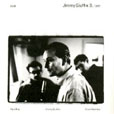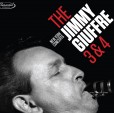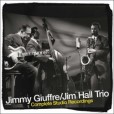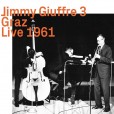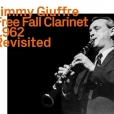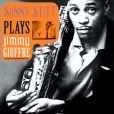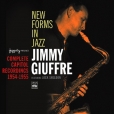Your basket is empty

The Verve LPs Fusion and Thesis — intense, questing, game-changing masterworks.
Jesus Maria tears up funerals.
Utterly stupendous music from JG’s long wilderness years — radio recordings freshly dug out from 1965, three years after the austerely avant-garde brilliance of Free Fall kissed goodbye to any chance of a record deal for the best part of a decade.
Amazingly, more than anything — out of nowhere — you hear the quicksilver, stark brawn of fellow-Texan Ornette Coleman. Bill Meyer’s review in the Wire hits it on the head. ‘His liberal use of split tones and abrasive timbres underline his awareness of the advances of Albert Ayler’ — whilst in other passages ‘Giuffre’s quick fingering and elongated tones sound like the missing link between first generation free jazz and the advances in technique that Evan Parker presented on his solo albums ten years down the road’. Jazz On A Summer Day it ain’t.
‘Free counterpoint’ is a kind of collective improvisation which envisions the New Thing without bluster. ‘He wrote out full scores,’ recalls Joe Chambers in the excellent booklet, ‘with drum parts written as another voice. They look like Schoenberg and Webern scores, right in line with what I had been studying in college.’
The other players are awesome, too. Bassist Richard Davis is here, perfumed with masterpieces like Out To Lunch, The Space Book and Rip, Rig And Panic, all recorded within the previous year. (That’s him on Astral Weeks, by the way.) Chambers’ drumming is sensational.
Jazz fans, it’s a must. Hotly recommended.
Scintillating recordings by Giuffre, Swallow and Bley, in the early winter of their annus mirabilis; mostly drawn from studio work earlier in the year, but exhilaratingly transformed, freshly spontaneous.
Hotly recommended.
Dazzling abscondments from bebop, as fresh and challenging now as then.
Microtonal and pointillistic; formally forensic and equal handed; freely and limpidly expressive. Strictly no going through the motions; no cliches; no posturing, or emotional bluster.
‘What comes out is an investigation of sound from the inside out, textually, tonally, spatially’ (as Pitchfork describes a much later session).
Clarinet solos, and duos and trios with Steve Swallow and Paul Bley.
Amazing stuff.
An overlooked jazz classic.
In step with Giuffre’s lean, startling arrangements, Stitt expressively reins in his virtuosity: he plays dazzlingly as ever, swinging hard, but with a new lyricism and freedom.
The band is killer — including Frank Rosolino, Jack Sheldon, and Lawrence Marable — and Giuffre himself plays some of his best tenor saxophone on record.
Scintillating and absorbing; hotly recommended.
